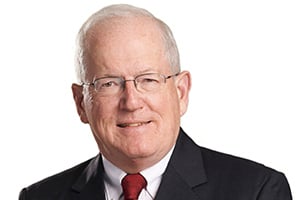Cook on Concord: Bob Baines was a great friend
Former Manchester mayor and West High principal made a lasting impact in the city

On the weekend of June 6-8, the University of New Hampshire held its Alumni Reunion Weekend, as it does each year. 2025 marked the 50th reunion of the Class of 1975, the 55th of the Class of 1970, and the 60th of the Class of 1965. Members of each class were in attendance, with the 50-year class getting the most attention — although among the 60-year class attendees was Bill Shaheen, prominent attorney and husband of Senator Jeanne Shaheen.
One of the events at reunion was a panel on free speech in the era of the Vietnam War, organized by former Governor John Lynch, UNH ’74, and former Secretary of State Bill Gardner, president of the Class of 1970. Panelists included Mark Wefers, student government president in 1970; this author, student government president in 1969; and James Splaine, former state senator and state representative, UNH ’71.
Governor Lynch introduced a panel of four Vietnam veterans who live at the NH Veterans Home in Tilton. These men recounted going to Vietnam either by draft or activation of their units, service, treatment on return, and reflected on the fact they went in order to serve their country, follow the orders of the President of the United States, and indicated that, while they may not have understood why we were fighting there or agreed with it, they would do it again if ordered to do so. They were impressive patriots.
Secretary Gardner has long been a student of the circumstances surrounding the student strike in 1970, following the Cambodian incursion and Kent State shootings, and the appearance of three of the “Chicago Seven” at UNH in May 1970. He showed a short film of the event, and an interview with former Governor Walter Peterson, governor at the time of the event, where Peterson described the thought process which led to allowing Abby Hoffman, David Delinger and Jerry Rubin to speak at seven in the evening, when a federal court had ordered them to speak only from three to five in the afternoon.
The appearance of the “Chicago Three,” as the event has been known since, was a big deal in New Hampshire in 1970. William Loeb, publisher of the Union Leader, used the upcoming appearance to bash UNH, its trustees and president John McConnell, as well as moderate Republican Peterson, long targets of Loeb and the paper. On campus, it was the cause of tension, and the UNH Field House was packed with thousands of students and faculty, awaiting the appearance. Wefers, then student body president, announced the three would not speak at the court-ordered time but when they originally were scheduled, at seven.
Peterson, McConnell, UNH Board Chairman Attorney Fred W. Hall of Rochester and Attorney General Warren B. Rudman had to decide whether to prohibit the speech and risk a student reaction, or allow it to proceed. Peterson described his thinking and that of the others in allowing the performance to proceed. On other tapes, Hall and McConnell have described this as not the hardest decision of their lives, all of them having lived through combat, the Depression, or other serious crises. (The event went on, the students dispersed peacefully, and the court order was forgotten. Wefers, having been accused of violating the order, ultimately was vindicated on First Amendment grounds, if memory serves.)
The panelists then reflected on the importance of free speech on campus and in America, Wefers reading the text of the First Amendment, and reflecting on the importance of having the right to speak and protest as the only power available to students at the time. Such action ultimately turned the nation against the war.
This writer pointed out several things about freedom of speech. First, it is easy to advocate protecting the speech rights of those you agree with, but harder and more important to do so about those with whom you disagree. Second, we all take our Constitutional rights for granted most of the time, and remember them only when they are under attack. Third, on a college campus, where one position on an issue may be held by the overwhelming majority, contrary ideas must be allowed to be heard and protected.
Finally, comparing the situation on campus faced in 1970 and the importance of free speech and the circumstances faced by the United States today were cited with alarm. With entire educational institutions of the highest reputation under attack by the President and Administration because they appear not to agree with or be submissive to their ideas — with contracts being cancelled on the suspect premise of opposing “anti-Semitism” on campus, with peaceful protesters being deported (or attempted to be deported) for expressing themselves in the United States — the dangers to our freedoms at present were raised for all to consider. The audience applauded, and was reminded that when falsehoods are stated or rights threatened, it is incumbent upon us all to speak up and speak truth to power.
Comparing the power of free speech in 1970 and the wisdom of mature leaders in handling a potentially volatile situation with the need to be vigilant in protecting First Amendment rights under attack today was a valuable exercise for UNH alumni at the reunion. It should be front and center for all of us every day.
Brad Cook is a Manchester attorney. The views expressed in this column are his own. He can be reached at bradfordcook01@gmail.com.